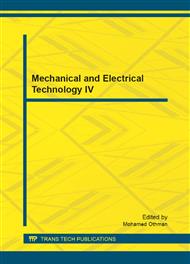p.2217
p.2221
p.2225
p.2229
p.2233
p.2239
p.2243
p.2248
p.2253
Discrete Time Sliding Mode on Model Reference Adaptive System Based Sensorless Induction Motor Drive
Abstract:
Sensorless induction motor drives are widely used in industry for their reliability and flexibility. It’s very important to improve the performance of speed estimation in some cases, especial at low speed of IM drives. The authors have proposed and developed a model reference adaptive system (MRAS) based on discrete time sliding mode algorithm(DTSM), which has high performance for sensorless induction motor drive in low speeds. The new algorithm obtains the identification flux using the classic MRAS, and the PI adaptive law in MRAS is replaced with the sliding mode observer which is acquired by the error function. This paper presents the theory, modelling, simulation and experimental results of the proposed DTSM-MRAS based sensorless direct torque control induction motor drives.
Info:
Periodical:
Pages:
2233-2238
Citation:
Online since:
November 2012
Authors:
Price:
Сopyright:
© 2012 Trans Tech Publications Ltd. All Rights Reserved
Share:
Citation:


